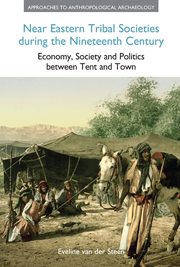 Near Eastern Tribal Societies during the Nineteenth Century
Near Eastern Tribal Societies during the Nineteenth Century Copy, o clerk! Whatever verses are fitting –
As long as the lock of my heart, o clerk! Is open –
Word following word, as when small locusts drive and are driven
And link the plain with the ridge of each enclosing slope.
(Translated by Musil 1928a)Introduction
Oral traditions are a rich source of information, provided they are eventually written down and preserved. With the exception of (some of) the elite, people in most of the Arab world were largely illiterate until the twentieth century, and their literary traditions were oral, transmitted through storytelling, reciting or singing. Arab society has always had a plethora of vernacular traditions: poetry, epic legends, tribal histories and genealogies. Andrew Shryock (1997) explored the present-day importance of oral traditions in two tribes of Jordan, the Adwan and the Abbadi, and he found that they are (or were during the 1980s) still vital for the sense of community and the continuation of tribal loyalty, asabiyyeh.
Over time, but mostly in recent years, much of this oral heritage has been written down, sometimes by the poets and storytellers themselves, often by travellers, historiographers and anthropologists. What we know of pre-Islamic literature is limited because of its oral nature. Some of it is preserved, however, and many pre-Islamic genres persisted until the nineteenth and even twentieth century (Bailey 1991; Hoyland 2001: 211–28).
To save this book to your Kindle, first ensure no-reply@cambridge.org is added to your Approved Personal Document E-mail List under your Personal Document Settings on the Manage Your Content and Devices page of your Amazon account. Then enter the ‘name’ part of your Kindle email address below. Find out more about saving to your Kindle.
Note you can select to save to either the @free.kindle.com or @kindle.com variations. ‘@free.kindle.com’ emails are free but can only be saved to your device when it is connected to wi-fi. ‘@kindle.com’ emails can be delivered even when you are not connected to wi-fi, but note that service fees apply.
Find out more about the Kindle Personal Document Service.
To save content items to your account, please confirm that you agree to abide by our usage policies. If this is the first time you use this feature, you will be asked to authorise Cambridge Core to connect with your account. Find out more about saving content to Dropbox.
To save content items to your account, please confirm that you agree to abide by our usage policies. If this is the first time you use this feature, you will be asked to authorise Cambridge Core to connect with your account. Find out more about saving content to Google Drive.